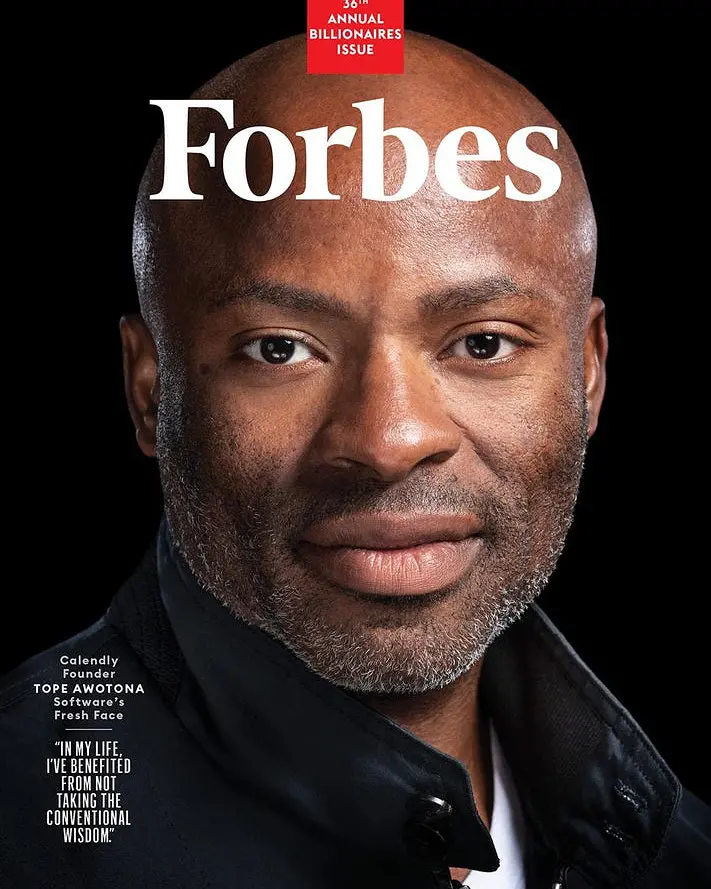Tope Awotona, 40, is Founder of Calendly, a go-to scheduling hub app that helps regulate work-life, appointments, and meetings, making work more effective and productive, and life easier and happier, the company is now worth a staggering $3 billion.
One of America’s wealthiest immigrants, Awotona is one of just two Black tech billionaires in the United States, along with David Steward, the 70-year-old founder of Missouri-based IT provider World Wide Technology. The entrepreneur, with a net worth of $1.4 billion graced the cover of coveted Forbes’ 36th Annual Billionaires Issue.
Built out of frustration in 2013, with all of his life savings of $200,000, he later went ahead to quit his job selling software for EMC. Today, the company has 10 million users and with Lyft, Ancestry.com, Indiana University, and La-Z-Boy among its customers.
Last year’s revenue passed $100 million, double what it booked the previous year, the trend is expected to follow suit this year, Forbes reports.
The company, founded in Atlanta but no longer has any physical offices, has been profitable since 2016, the site reports.
“Tope could be the most successful African-American tech entrepreneur of his generation,” says David Cummings, founder of Atlanta Ventures, which led a $550,000 seed investment in Calendly seven years ago.
“In my life, I’ve benefited from not taking the conventional wisdom,” said Awotona. “It’s benefited me personally, and I think it has benefited the business.”
Although Calendly faces other competitors like Square, Microsoft, and Zurich-based Doodle with competing products, Calendly has gained traction with its sleek, consumer-friendly design and its freemium model that lets it gain paying customers with no marketing.
Born in Lagos, Nigeria, into a middle-class family, Awotona’s
father was a microbiologist and entrepreneur; his mother worked at the central bank. His road to success was riddled with heartbreaks and failure, at age 12 he witnessed his father get shot and killed in a carjacking. “There was a part of me, from a very early age, that wanted to redeem him,” he once said.
In 1996, when he was 15, he moved with his family to Atlanta. He studied computer science at the University of Georgia, then switched to business and management information. “I loved coding, but it was too monotonous,” he says. “I’m probably too extroverted to be a coder.”
Instead, he sold software for tech companies, including Perceptive Software, Vertafore and EMC (since acquired by Dell). Before getting his big break with Calendly, he delved into three entrepreneurship ventures which failed: a dating website, a company that sold projectors, and another that sold garden tools.
Although Calendly was different, it also witnessed some bumps along the line, as a salesman setting up meetings—a task that would sometimes take dozens of emails and days of delay. “The obvious idea to me was that scheduling is broken,” he says. In 2013, he launched Calendly from Atlanta Tech Village, a coworking space for entrepreneurs. To fund it, he raided his 401(k) and maxed out his credit cards. “It could’ve gone really badly,” he says. “With my previous businesses, I hedged my bets a little bit and gave myself a way out. With Calendly I flew into a war zone and put in every cent I had. If you’re going to do something, you have to go all in.”
With Calendly, Awotona is not done and aims to introduce new features in Calendly and aims to introduce new features such as increased analytics, international expansion, and attaching candidates’ résumés to recruiters’ calendars to distinguish the brand.
“If you’re going to do something, you have to go all in,” said the billionaire tech founder.



